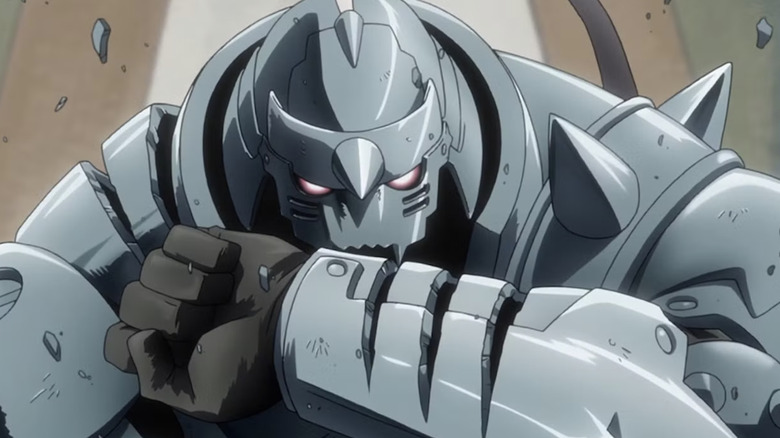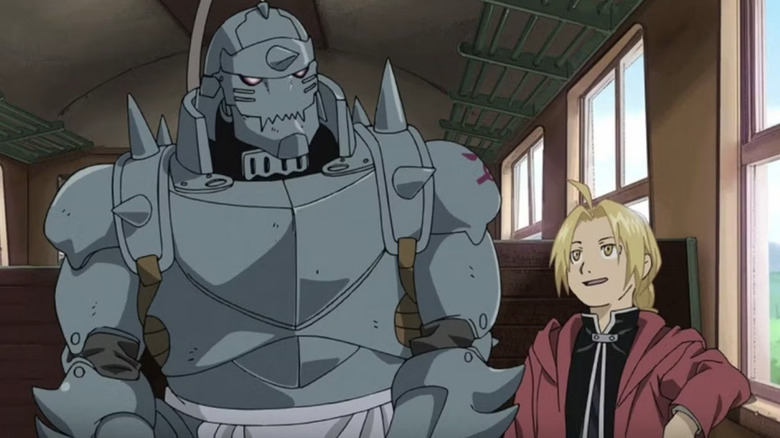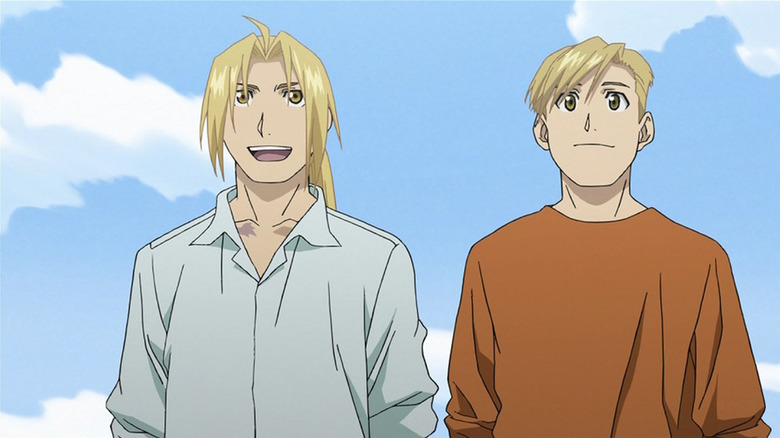Why Fullmetal Alchemist: Brotherhood Replaced Al's Original English Voice Actor
Ah, "Fullmetal Alchemist." Hiromu Arakawa's breakout manga follows two alchemist brothers, Edward and Alphonse Elric, on a quest to find the Philosopher's Stone. They tried, and failed, to bring their dead mother Trisha back to life with alchemy — instead of regaining their mother, Ed lost his left leg and Al his whole body. (Ed then gave up his right arm to bind Al's soul to a suit of armor.). Now, only the mythic elixir can help the two brothers heal each other both in body and spirit.
It's one of my favorite anime and a key reason I think about it so often is because it's really two anime in one. Studio Bones adapted Arakawa's original "Fullmetal Alchemist" manga twice, first in 2003 then again in 2009 for a second, more faithful anime known in the West as "Fullmetal Alchemist: Brotherhood."
The two shows complement each other by being so different. (The 2003 anime had an incomplete blueprint, so they wrote an original story distinct from Arakawa's.) They begin in the same place, with the same themes — from the interconnectivity of all our individual lives to the value those lives have — and character arc start points and then reach different conclusions. "Fullmetal Alchemist" is a richer story for having two paths, no matter which one you watch first.
It's not just the original Japanese crew that put their (fullmetal) hearts into the show. The two "Fullmetal Alchemist" series, collectively, have probably the best English anime dub next to "Cowboy Bebop."
The original Japanese "Fullmetal Alchemist" uses the "adult woman playing young boy" voicing acting trick; Ed is voiced by Romi Park, and Al by Rie Kugimiya. This trick is often employed in both American animation (e.g. Nancy Cartwright as Bart Simpson) and anime. It's not only the Elric brothers who are women behind the mics, so are Goku (Masako Nozawa), Naruto (Junko Takeuchi), and many more.
Funimation's English dub of "Fullmetal Alchemist" did something different. Ed was dubbed by the (now-disgraced) Vic Mignogna, who made his voice sound 20 years younger. Then, Al was voiced by Aaron Dismuke — an actual 12-year-old boy just like his character. Dismuke's casting kept the joke about Al from the original Japanese intact; a huge, imposing suit of armor has the high-pitched voice of a little boy coming out of it. (To achieve the echo effect of Al's armor, Dismuke would speak into a bowl affixed on the mic stand.)
When "Brotherhood" premiered in the U.S. in 2010, Dismuke had gone through puberty and his voice had deepened — too deep to be convincing as a 12-year-old anymore. The new dub had circled around to doing what the original Japanese had done all along by casting Maxey Whitehead, an adult woman, as Al.
Better Alphonse Elric - Aaron Dismuke or Maxey Whitehead?
I prefer Maxey Whitehead as Al over Aaron Dismuke (and that's not the only reason "Fullmetal Alchemist: Brotherhood" is better). Sure, Dismuke brings greater authenticity — down to having the limited emotional range of a young boy. Whitehead's Al sounds almost indistinguishable from Dismuke's but as an actress, she has much greater range. Speaking to Anime News Network in 2010, she said that voice director Mike McFarland asked her to imitate Dismuke's Alphonse during her audition. She succeeded, and brought superior acting ability too.
Now, this is not to bash Dismuke or his performance in "Fullmetal Alchemist." It was his first acting job ever, and he was 12 years old! You have to adjust your expectations for child actors compared to adult ones and that goes extra when the acting is as technically difficult as dubbing. That's a big reason why it's so common for women to voice young male characters in animation. Little boys usually have high-pitched, androgynous voices, and adult voice actresses can hit the needed pitch but also have the talent and experience to perform, take correct direction, and so on.
Dismuke has kept dubbing and grown into a capable actor too. The talent was there, it just needed to be nurtured. He even got a cameo in "Brotherhood" as Ed and Al's dad Van Hohenheim. Specifically, episode 40 contains flashbacks to Hohenheim's teenage years, when he still looked a lot like both of his sons. In those flashbacks, the young Hohenheim is dubbed by Dismuke.
Which actors were recast from Fullmetal Alchemist to Fullmetal Alchemist: Brotherhood?
The recasting of Al does stand out, though, since Funimation mostly reused the original English "Fullmetal" cast for the "Brotherhood" dub: Ed, Travis Willingham as Colonel Roy Mustang, Colleen Clinkenbeard as Lieutenant Riza Hawkeye, Caitlin Glass as Winry Rockbell, Chris Sabat as Major Alex Louis Armstrong, Laura Bailey as Lust, etc.
Similar to Dismuke, other actors got to play different parts if their original character didn't exist in "Brotherhood." Troy Baker (best known for "The Last of Us" games these days) went from voicing corrupt Colonel Frank Archer to the homunculus Greed. Monica Rial, who played the 2003 series' big bad Dante, instead voiced the plucky young alchemist May Chang. Kent Williams got promoted from a one episode filler bad guy in "Fullmetal Alchemist" to the main villain of "Fullmetal Alchemist: Brotherhood" — Father.
There were a couple other recastings, though. The anti-alchemy vigilante Scar was dubbed by Dameon Clarke in the 2003 "Fullmetal Alchemist," then by J. Michael Tatum in "Brotherhood." (Tatum's older, deeper, and more impassioned voice better suits Scar.) Scott McNeil voiced Hohenheim in the first anime but McNeil, who is Canadian, rarely works in the U.S. For the "Brotherhood" English dub, he was replaced by Funimation regular John Swasey.
The Japanese cast of "Fullmetal Alchemist: Brotherhood" is a different story when it came to recasting. Park and Kugimiya were brought back as Ed and Al, as well as some supporting characters such as Hidekatsu Shibata as King Bradley, Keiji Fujiwara as Maes Hughes, and Kenji Utsumi as Alex Louis Armstrong. Every other major character was recast. Keep in mind that while "Brotherhood" was made at the same studio, it had a different director and production crew who probably had some different visions for the characters than the first crew did.
Still, it's amusing that Alphonse Elric was one of the only "Fullmetal" characters not recast in Japanese, and one of the few who was in English.


